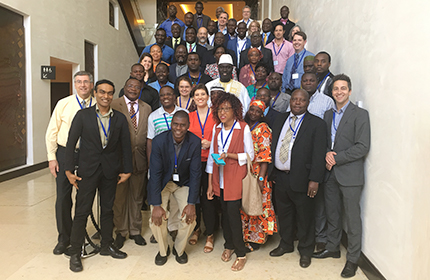West Africa Consultative Meeting on Gene Drive Technology
-

October 16, 2016-October 19, 2016
Accra, Ghana
Overview
The New Partnership for African Development (NEPAD) organized a regional consultation that examined the basic principles of environmental risk assessment, the process of how environmental protection goals are translated into operation endpoints for risk assessment (“problem formulation”), and the application of this process to the use of gene drives for either population modification or population suppression in mosquito vectors of malaria.
The goals of the workshop were to develop a more informed understanding of plausible risks associated with the use of gene drive strategies to control mosquito-borne diseases in West Africa and make recommendations about the research needed to provide better information to address those risks. NEPAD requested that the Agriculture & Food Systems Institute assist them in setting the agenda for the scientific program, and to guide participants through a problem formulation exercise that can help inform future work. Agriculture & Food Systems Institute’s efforts are supported by a grant from the Foundation for the National Institutes of Health.
Program
The workshop included international experts on the biology of Anopheles mosquitoes, gene drive technology and biosafety regulation. The program included:
Preliminary Session: Terminologies and general concepts of gene drives
This session introduced participants to general terms associated with gene drive technology.
Session I: Purpose and score of gene drives
This session explained how gene drives work, and highlighted gene drive applications to develop vector control tools. Benefits, challenges and processes as well as strategies and plans involved in the implementation process of the technology were discussed.
Session II: Biology of the Mosquito
This session explained the biology of Anopheles and Aedes mosquitoes, highlighting their lifecycle, growth patterns, mobility, mating system, role in the food chain and the general parasite transmission mechanisms and categories of diseases spread (malaria, zika, dengue, chikunguna, etc.)
Session III: Target Malaria Project
This session provided insight into the Target Malaria Project; stepwise approach, ongoing work in Africa, pathways for deployment and roles of regulators in the implementation process.
Session IV: Case Studies
This session covered case studies on related modified mosquito technology, describing practical experiences on how the regulatory and public engagement processes have been handled. It also covered the Asilomar conference on recombinant DNA technology which had a profound influence on future directions of biosafety from gene technology that are still felt today.
Session V: Program in regulatory mapping, capacity building and regional harmonization
This session covered regulatory mapping and capacity building services offered by the African Biosafety Network of Expertise (ABNE) and the African Medicines Regulatory Harmonization Programme (AMRH) under the AU platform in order to stimulate a discussion on regulatory approaches for the region and countries. Participants also had the opportunity to identify key stakeholders that would be involved in establishing functional regulatory systems at national and regional levels for gene drive technology for public health.
Session VI: Review of Risk Assessment and Introduction to Problem Formulation Methodology
Led by the Agriculture & Food Systems Institute, this session reported on a previous workshop held in May 2016, which began the process to develop a more informed understanding of plausible risks associated with the use of gene drive strategies to control mosquito-borne diseases, including ecological risks as well as risks to human health, and make recommendations about the information needed to address those risks.
Session V: Problem Formulation for gene drive mosquitoes
This session was also led by the Agriculture & Food Systems Institute and included a breakout exercise where participants could go through the problem formulation process.
To learn more about the Agriculture & Food Systems Institute’s program on environmental risk assessment of gene drives, click here.
